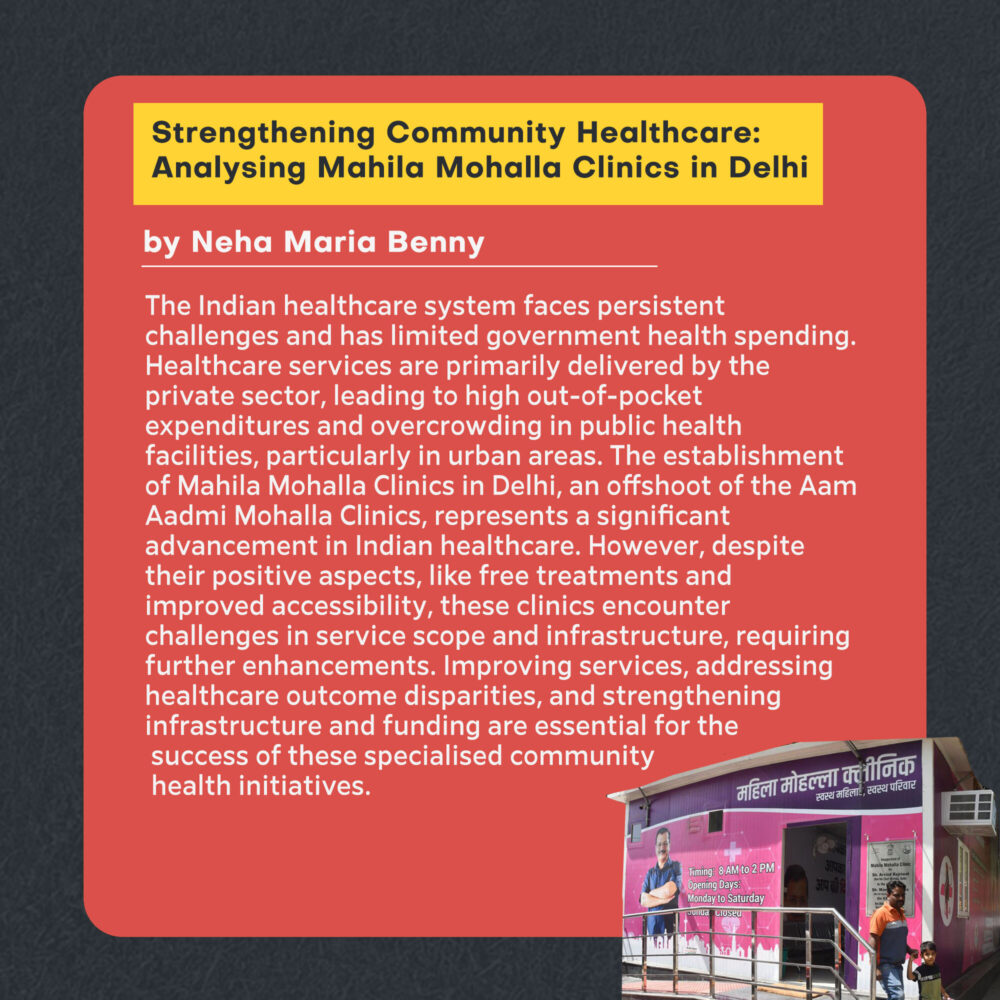Policy and Healthcare
The Indian healthcare model, driven by both the public and the private sector, faces issues concerning affordability, consistency in quality, and universal access. Policy interventions ensure the development and maintenance of healthcare services across the country. This month at SPRF, we take a look at how healthcare programmes and policies impact the country at a grassroot level.

1

The Indian healthcare system faces persistent challenges and has limited government health spending. Healthcare services are primarily delivered by the private sector, leading to high out-of-pocket expenditures and overcrowding in public health facilities, particularly in urban areas. The establishment of Mahila Mohalla Clinics in Delhi, an offshoot of the Aam Aadmi Mohalla Clinics, represents a significant advancement in Indian healthcare. However, despite their positive aspects, like free treatments and improved accessibility, these clinics encounter challenges in service scope and infrastructure, requiring further enhancements. Improving services, addressing healthcare outcome disparities, and strengthening infrastructure and funding are essential for the success of these specialised community health initiatives.
2

Known as the grassroots-level crusaders of India’s healthcare system, ASHA workers are non-medical health workers appointed and trained by the National Rural Health Mission. They assist with on-the-ground initiatives for maternal care, immunisation of children against diseases that can be prevented by vaccines, neglected tropical diseases, communicable disease prevention and control, and promoting knowledge about good nutrition, hygiene, and healthy living. However, their work is plagued by challenges and barriers at the operational and institutional levels. The past several years have seen increased responsibilities and the expansion of many community-based health programs, which has left ASHAs overworked and stressed out.
3

According to the World Bank, India has one of the world’s highest populations of children suffering from malnutrition. The COVID-19 pandemic has exposed the underlying conditions surrounding India’s healthcare system today. In light of this unprecedented health crisis, this paper seeks to highlight the issues gripping healthcare in the country. Focusing on inequitable access and lack of affordability to basic healthcare services, it further highlights the pressing need to recognise Right to Health as a fundamental right.
4

Ayushman Bharat Yojana is the latest health insurance scheme funded by the Government of India. Ayushman Bharat Yojana subsumed the already existing Rashtriya Swasthya Bima Yojana, apart from borrowing its basic design. However, no past healthcare financing scheme in India has succeeded in covering all eligible beneficiaries or reducing catastrophic financial expenditure for the people.
This report does not simply aim to inform the readers of the features of ABY that sets it apart from its predecessors. It also delves into the reasons behind why the poorest segment of our population has been unable to avail even the most basic health services.
Editor's pick curated by Adrita Choudhury
